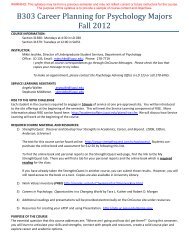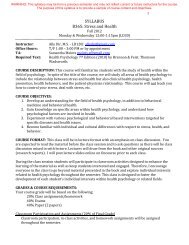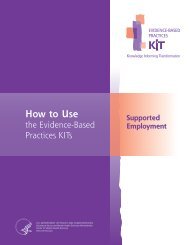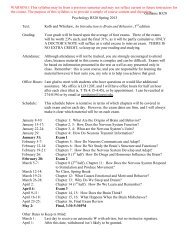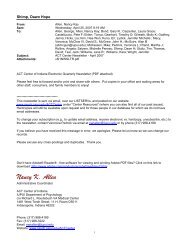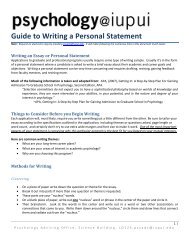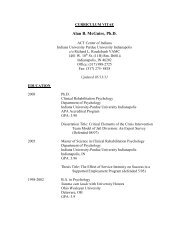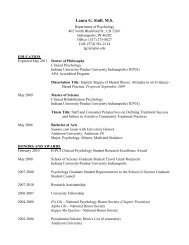Supported Employment: Training Frontline Staff - SAMHSA Store ...
Supported Employment: Training Frontline Staff - SAMHSA Store ...
Supported Employment: Training Frontline Staff - SAMHSA Store ...
You also want an ePaper? Increase the reach of your titles
YUMPU automatically turns print PDFs into web optimized ePapers that Google loves.
Working effectively<br />
with consumers<br />
The overall aim of SE is to facilitate recovery. The<br />
idea of recovery may be new to you if you came of<br />
age professionally in an earlier era when the mental<br />
health field generally held low expectations for<br />
people with serious mental illnesses.<br />
In the recovery framework, the expectation is that<br />
consumers can live a life in which mental illness<br />
is not the driving factor for their lives. Recovery<br />
means more than expecting people to simply cope<br />
with mental illness or maintaining people with<br />
mental illnesses in the community.<br />
In a recovery framework,<br />
employment specialists follow<br />
• Promote hope<br />
• Support consumers in their efforts to take<br />
personal responsibility for health and life<br />
choices<br />
• Help consumers get on with life beyond<br />
illness<br />
The following approaches and related interpersonal<br />
skills will help you follow these recovery principles<br />
and work effectively with consumers.<br />
Promote hope<br />
You can enhance hopefulness in these ways:<br />
• Voicing positive statements; and<br />
• Expressing empathy.<br />
Voice positive statements<br />
Having gone through a lot, consumers sometimes<br />
lose track of their strengths. As part of developing a<br />
working relationship with consumers, you can build<br />
rapport by making positive statements. Positive<br />
comments about consumers can address these<br />
characteristics:<br />
• Motivation for work;<br />
• Past efforts to find work;<br />
• Prior job experiences;<br />
• Social skills; or<br />
• Any other attribute worthy of praise.<br />
Expressing heartfelt positive statements to<br />
consumers may remind them of their strengths.<br />
The positive tone set by these comments early<br />
in the relationship can contribute to a sense of<br />
optimism and good will that helps the process of<br />
job search and maintenance.<br />
Many people have a natural tendency to focus<br />
more on their negative qualities than their positive<br />
qualities. This tendency can be even greater<br />
in people with serious mental illnesses, due to<br />
personal setbacks they may have experienced and<br />
negative emotions such as anxiety and depression.<br />
For example, when describing their work history,<br />
consumers may tend to focus more on their job<br />
failures and difficulties holding down a job than<br />
on personal successes. For another example, when<br />
describing how things are going at a current job,<br />
consumers may focus more on problems they are<br />
experiencing than areas in which they are successful.<br />
Focusing only on the negatives and ignoring the<br />
positives can result in consumers’ being discouraged<br />
and pre-occupied by their sense of “failure.” By<br />
pointing out positive examples of personal strengths<br />
and job success, you can counter the natural<br />
tendency to focus only on the negative.<br />
Pointing out positives can help consumers by<br />
creating a more balanced picture of the consumer,<br />
which can neutralize, or even make positive,<br />
consumers’ overall impression of the situation.<br />
Pointing out positives can also help consumers<br />
become more aware of their personal strengths,<br />
which can be capitalized on to maximize job<br />
performance and functioning at work.<br />
<strong>Training</strong> Job Supports <strong>Frontline</strong> and Collaborations <strong>Staff</strong> 9 Module 4



